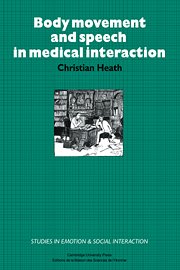Book contents
- Frontmatter
- Contents
- Preface
- The transcription system
- 1 Video analysis: interactional coordination in movement and speech
- 2 The display of recipiency and the beginning of the consultation
- 3 Maintaining involvement in the consultation
- 4 Forms of participation
- 5 The physical examination
- 6 Taking leave of the doctor
- 7 Postscript: the use of medical records and computers during the consultation
- Notes
- References
- Index
5 - The physical examination
Published online by Cambridge University Press: 19 January 2010
- Frontmatter
- Contents
- Preface
- The transcription system
- 1 Video analysis: interactional coordination in movement and speech
- 2 The display of recipiency and the beginning of the consultation
- 3 Maintaining involvement in the consultation
- 4 Forms of participation
- 5 The physical examination
- 6 Taking leave of the doctor
- 7 Postscript: the use of medical records and computers during the consultation
- Notes
- References
- Index
Summary
Licence my roving hands, and let them go, Before, behind, between, above, below.
Donne 1633/1950, p. 88Not merely do the practitioners, by virtue of gaining admission to the charmed circle of colleagues, individually exercise the license to do things others do not do, but collectively they presume to tell society what is good and right for the individual and for society at large in some aspect of life. Indeed, they set the very terms in which people may think about this aspect of life. The medical profession, for instance, is not content merely to define the terms of medical practice. It also tries to define for all of us the very nature of health and disease. When the presumption of a group to a broad mandate of this kind is explicitly or implicitly granted as legitimate, a profession has come into being.
Hughes 1958, p. 79Although defining a person as a technical object is necessary in order for medical activities to proceed, it constitutes an indignity in itself. This indignity can be cancelled or at least qualified by simultaneously acknowledging the patient as a person.
Emerson 1970/1973, p. 362In his essays on the nature of work and occupations Hughes develops his classic statement concerning the licence and mandate of the medical profession. In everyday medical practice there is perhaps no clearer example of the legitimacy granted to the profession than the activities conducted by the doctor during the physical examination. In fact it is only relatively recently that medical practitioners have been granted such a broad licence to examine patients' bodies.
- Type
- Chapter
- Information
- Body Movement and Speech in Medical Interaction , pp. 99 - 127Publisher: Cambridge University PressPrint publication year: 1986
- 1
- Cited by



